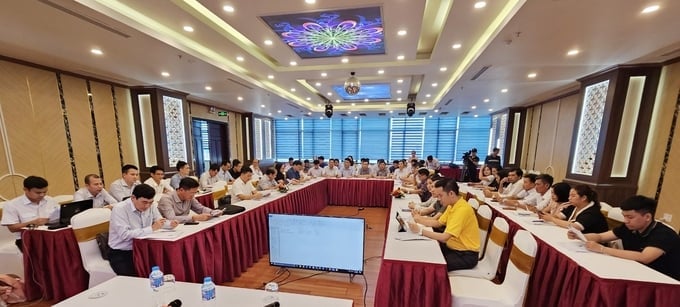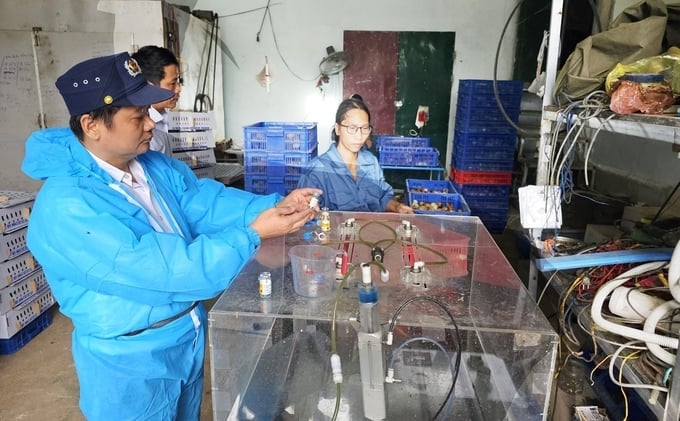May 31, 2025 | 03:53 GMT +7
May 31, 2025 | 03:53 GMT +7
Hotline: 0913.378.918
May 31, 2025 | 03:53 GMT +7
Hotline: 0913.378.918

Workshop on digital transformation in the animal health sector in Quang Binh province. Photo: T. Phung.
According to Mr. Tran Dinh Hiep, Deputy Director of the Quang Binh province's Department of Agriculture and Rural Development, digital transformation and the application of information technology and digital techniques in agriculture, livestock production and animal health efforts, represent an essential trend of the fourth Industrial revolution.
Quang Binh is one of the first nine provinces nationwide to organize a workshop to initiate digital transformation in the field of livestock production and animal health in 2023.
Mr. Hiep further emphasizes the application of digital transformation in disease management on land and in animal health efforts, outlining a direction to meet development needs. "The high-tech application in the digital transformation of the livestock production and animal health sector in Quang Binh province serves as a significant impetus for increasingly effective animal health efforts," stated Mr. Hiep.
However, the implementation of digital transformation remains a challenging task for the animal health workforce in Quang Binh province. According to Mr. Tran Cong Tam, Director of the Quang Binh province's Department of Agriculture and Rural Development, the unit has engaged in meetings, discussions, and sought advice from organizations specializing in information technology and universities with expertise in livestock production and animal health to acquire specific guidance for this mission.
"These are important foundations to find a common direction for the digital transformation in the animal health sector, thereby contributing to sustainable livestock development," Mr. Tam added.
According to the Quang Binh province's Sub-Department of Livestock Production and Animal Health, there are currently 428 livestock farms throughout the province in compliance with Decree No. 13/2020/ND-CP. Namely, there are 9 large-scale farms, 95 medium-scale farms, and 324 small-scale farms. A small number of farms have applied advanced technology to agricultural production, yielding effective results and contributing to the restructuring of animal husbandry.
Accordingly, these livestock farms have adopted advanced closed-loop breeding processes, organic farming methods, automated cooling systems, probiotic fermented feed, bio-bedding, and waste treatment using biogas.
We joined a delegation from the Quang Binh province's Sub-Department of Livestock Production and Animal Health to visit a poultry breeding farm in Van Ninh commune, Quang Ninh district. Mr. Tran Thanh Ngoc, the farm owner, mentioned that the farm annually supplies 50,000 breeding chickens to serve farmers in the market.
The farm employs automated technology in the processes of feed conversion and water supply for the livestock. The egg incubators are also automated, leading to a very high successful hatching rate. Before the breeding chickens are released, they are vaccinated and sprayed with medicine through an automated system supervised by animal heatlh staff.
"Thanks to the automated system, our breeding chickens are guaranteed to be disease-free at the time of sale, and the poultry farmers can produce commercial chickens within four months. Through digital transformation and technology adoption, our breeding, care, disease prevention, and the efficient consumption of breeding chickens have been improved," stated Mr. Ngoc.

Utilizing chemical spraying technology to prevent diseases in the chicken flock before sale can ensure safe disease control. Photo: T. Phung.
An Viet High-Tech Agriculture Limited Company has invested in constructing two high-tech duck breeding houses, accommodating a scale of 15,000 market ducks in Son Thuy commune, Le Thuy district, Quang Binh province.
Mr. Thai Hoa Nam, Director of An Viet Company, shared, "We have built a food storage area to supply 15,000 market ducks per batch, and set up a Biogas tank to manage waste and breeding wastewater."
The majority of processes in the high-tech duck production chain has been automated. Accordingly, the breeding pens are equipped with automatic feeding and water supply systems, and have a temperature-controlled cooling system which adjusts according to each stage of the ducks' growth and development.
Furthermore, wastewater from floor sanitization is collected and transfered to the biogas tank for treatment and reuse. Consequently, the ducks are exceptionally healthy, minimizing the risk of disease.
With timely guidance and supervision from the Quang Binh province's Sub-Department of Livestock Production and Animal Health, positive transformations have been observed in animal health efforts. Outbreak of diseases in livestock, poultry, and aquaculture production has decreased considerably compared to the same period in 2022.
Mr. Tran Cong Tam stated that digital transformation has significantly supported animal health management within the province. Despite the limited workforce overseeing multiple sectors, digital transformation and high-tech application have supported with supervision, timely updates, and clarity. Additionally, prompt detection and containment of animal and aquatic diseases have notably reduced losses for local residents.
Translated by Nguyen Hai Long

(VAN) Several scientists and farmers are experimenting with soil treatment in some key durian-growing regions such as Cai Lay (Tien Giang), Dak Song, Gia Nghia, and Dak R’lap (Dak Nong).
/2025/05/25/4127-3-073637_820.jpg)
(VAN) Thanks to the promotion from an FAO-implemented project, vegetable production in greenhouses in Moc Chau has seen strong development, from 1.5 hectares in 2021 to nearly 50 hectares in 2024.

(VAN) FAO has recently supported USD 140,000 to implement the project 'Risk mitigation human-animal interface risks through disease control initiatives in pig farming.'

(VAN) The People's Committee of Tra Vinh province has approved an adjustment to the investment policy for the Green Hydrogen Plant project, increasing its area to approximately 52.76 hectares.
![Reducing emissions from rice fields: [2] Farmers’ commitment to the soil](https://t.ex-cdn.com/nongnghiepmoitruong.vn/608w/files/news/2025/05/05/dsc08881jpg-nongnghiep-140632.jpg)
(VAN) Clean rice cultivation model in Thuong Tan commune, Bac Tan Uyen district, is assisting local residents in achieving sustainable agriculture by substantially reducing costs, increasing productivity, and protecting the environment.

(VAN) At the conference to disseminate Resolution No. 68, AgriS introduced its digital agricultural ecosystem and reaffirmed its commitment to accompanying the Government in promoting private sector development and sustainable agriculture.

(VAN) 'Blue Ocean - Blue Foods' initiative is designed to restore marine ecosystems and establish sustainable livelihoods for local communities by cultivating a minimum of 1,000 hectares of cottonii seaweed in the first three years.